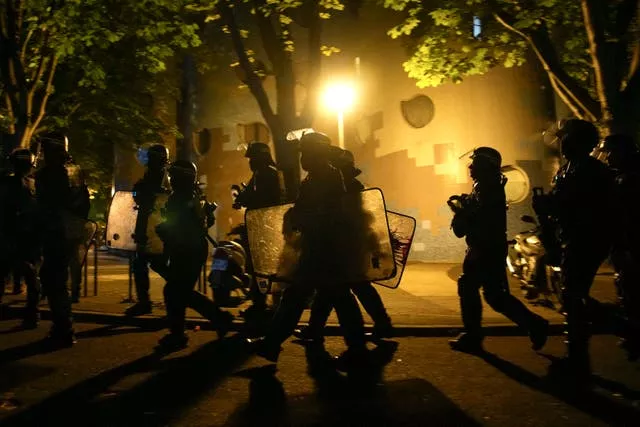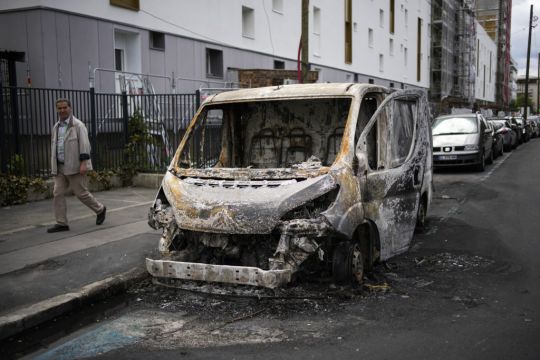French president Emmanuel Macron has scrapped an official trip to Germany after a fourth straight night of rioting and looting across France sparked by the fatal shooting of a teenager by police.
News of the cancellation came as hundreds of people turned out for the burial of the 17-year-old, whose killing by officers in a Parisian suburb on Tuesday triggered the unrest.
France’s interior ministry announced that in the latest night of violence, 1,311 people had been arrested around the country, as 45,000 police officers fanned out in a so-far unsuccessful bid to restore order.
Since the outbreak of violence sparked by the teenager’s death, some 2,400 people have been arrested overall.
The French justice minister said 30% of those detained were minors, some as young as 13. Eric Dupond-Moretti hit out at the youngsters’ parents, saying: “It’s not up to the state to raise children.”
The protesters and rioters turned out on the streets of a number of cities and towns, clashing with police, despite Mr Macron’s appeal to parents to keep their children at home.

About 2,500 fires were set and shops were also ransacked, according to authorities.
The violence in France is also taking a toll on Mr Macron’s diplomatic profile.
German President Frank-Walter Steinmeier’s office said Mr Macron had phoned on Saturday to request a postponement of what would have been the first state visit by a French president to Germany in 23 years.
Mr Macron had been scheduled to fly to Germany on Sunday evening for the visit to Berlin and two other German cities.
The French leader’s office said he had spoken with Mr Steinmeier and, “given the internal security situation, the president (Mr Macron) said he wishes to stay in France over the coming days”.

Given the importance of the French-German relationship on the European political scene, the scrapping of the official trip was a clear sign of the gravity of the unrest in France.
Earlier this year, the King cancelled his first foreign visit as UK monarch, initially planned for France, because of intense protests over Mr Macron’s pension reform plans.
The teenager, who has only been identified as Nahel, was shot during a traffic stop on Tuesday in the Parisian suburb of Nanterre.
Video of the incident shows two officers at the window of the car, one with his gun pointed at the driver. As the teenager pulls forward, the officer fires once through the windshield.
Ceremonies to bid farewell to Nahel began on Saturday with a viewing of the open coffin by family and friends, and culminated with his burial in a hilltop cemetery in the town.
At the cemetery’s entrance, with central Paris visible in the distance, hundreds of people lined up along the road to pay tribute to Nahel.

The crowd carried his white casket above their heads and into the cemetery for the burial, which was barred to the media. Some of the men carried folded prayer rugs.
Before the burial, prayers were held at a mosque.
Applause resounded as Nahel’s mother Mounia M, dressed in white, walked through the gate and toward the grave. Earlier in the week she told France 5 television that she was angry at the officer who shot her son, but not at the police in general.
“He saw a little Arab-looking kid, he wanted to take his life,” she said.
“A police officer cannot take his gun and fire at our children, take our children’s lives,” she said.
The teenager’s family has roots in Algeria.
The police officer accused of killing Nahel was given a preliminary charge of voluntary homicide, meaning that investigating magistrates strongly suspect wrongdoing, but need to investigate more before sending a case to trial.
Nanterre prosecutor Pascal Prache said that his initial investigation led him to conclude that the officer’s use of his weapon was not legally justified.

Anger over Nahel’s death erupted in violence in Nanterre and in many major cities, including Paris, Marseille and Lyon, and even in the French territories overseas, where a 54-year-old died after being hit by a stray bullet in French Guiana.
Hundreds of police and firefighters have been injured, including 79 overnight. Authorities have not released injury tallies for protesters.
France’s national football team – including international star Kylian Mbappe, an idol to many young people in the disadvantaged areas where the anger is rooted – have pleaded for an end to the violence.
“Many of us are from working-class neighbourhoods, we too share this feeling of pain and sadness” over the killing of Nahel, the players said in a statement.
Early on Saturday, firefighters in Nanterre extinguished blazes set by protesters that left scorched remains of cars strewn across the streets.

In the neighbouring suburb of Colombes, protesters overturned garbage bins and used them for makeshift barricades.
Looters during the evening broke into a gun shop and made off with weapons in the Mediterranean port city of Marseille, police said.
Meanwhile, buildings and businesses were also vandalised in the eastern city of Lyon, police said.
Despite the escalating crisis, Mr Macron held off on declaring a state of emergency, an option last used in 2005. But the government has ratcheted up its law enforcement response, with the mass deployment of police officers, including some who were called back from vacation.
The rioting puts new pressure on Mr Macron, who has blamed social media for fuelling violence.

French interior minister Gerald Darmanin has ordered a nationwide night-time shutdown of all public buses and trams, which have been among rioters’ targets.
He has also warned social networks not to allow themselves to be used as channels for calls to violence.
The violence comes just over a year before Paris and other French cities are due to host the Olympic Games.
Organisers are closely monitoring the situation as preparations for the competition continue.
Thirteen people who did not comply with traffic stops were fatally shot by French police last year.
This year, another three people, including Nahel, died under similar circumstances.
The deaths have prompted demands for more accountability in France, which also saw racial justice protests after George Floyd’s killing by police in Minnesota.







